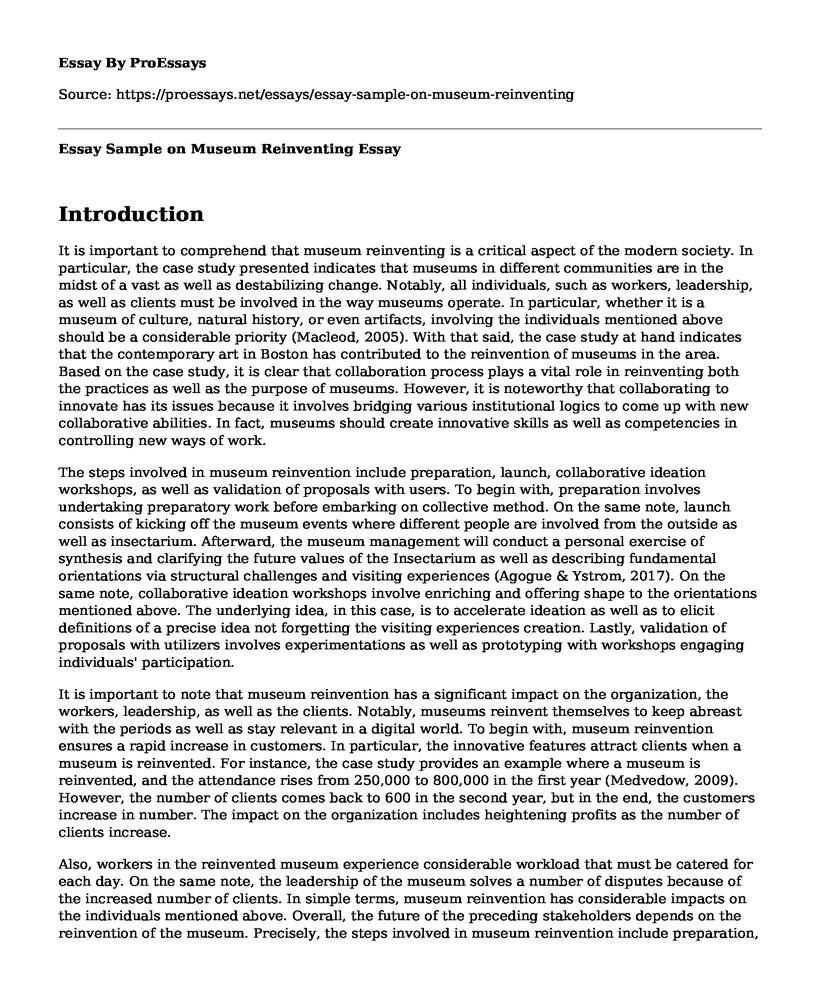Introduction
It is important to comprehend that museum reinventing is a critical aspect of the modern society. In particular, the case study presented indicates that museums in different communities are in the midst of a vast as well as destabilizing change. Notably, all individuals, such as workers, leadership, as well as clients must be involved in the way museums operate. In particular, whether it is a museum of culture, natural history, or even artifacts, involving the individuals mentioned above should be a considerable priority (Macleod, 2005). With that said, the case study at hand indicates that the contemporary art in Boston has contributed to the reinvention of museums in the area. Based on the case study, it is clear that collaboration process plays a vital role in reinventing both the practices as well as the purpose of museums. However, it is noteworthy that collaborating to innovate has its issues because it involves bridging various institutional logics to come up with new collaborative abilities. In fact, museums should create innovative skills as well as competencies in controlling new ways of work.
The steps involved in museum reinvention include preparation, launch, collaborative ideation workshops, as well as validation of proposals with users. To begin with, preparation involves undertaking preparatory work before embarking on collective method. On the same note, launch consists of kicking off the museum events where different people are involved from the outside as well as insectarium. Afterward, the museum management will conduct a personal exercise of synthesis and clarifying the future values of the Insectarium as well as describing fundamental orientations via structural challenges and visiting experiences (Agogue & Ystrom, 2017). On the same note, collaborative ideation workshops involve enriching and offering shape to the orientations mentioned above. The underlying idea, in this case, is to accelerate ideation as well as to elicit definitions of a precise idea not forgetting the visiting experiences creation. Lastly, validation of proposals with utilizers involves experimentations as well as prototyping with workshops engaging individuals' participation.
It is important to note that museum reinvention has a significant impact on the organization, the workers, leadership, as well as the clients. Notably, museums reinvent themselves to keep abreast with the periods as well as stay relevant in a digital world. To begin with, museum reinvention ensures a rapid increase in customers. In particular, the innovative features attract clients when a museum is reinvented. For instance, the case study provides an example where a museum is reinvented, and the attendance rises from 250,000 to 800,000 in the first year (Medvedow, 2009). However, the number of clients comes back to 600 in the second year, but in the end, the customers increase in number. The impact on the organization includes heightening profits as the number of clients increase.
Also, workers in the reinvented museum experience considerable workload that must be catered for each day. On the same note, the leadership of the museum solves a number of disputes because of the increased number of clients. In simple terms, museum reinvention has considerable impacts on the individuals mentioned above. Overall, the future of the preceding stakeholders depends on the reinvention of the museum. Precisely, the steps involved in museum reinvention include preparation, launch, collaborative ideation workshops, as well as validation of proposals with users. Lastly, museum reinventing is a critical aspect of the modern society. In particular, the case study presented indicates that museums in different communities are in the midst of a vast as well as destabilizing change.
References
Agogue, M., & Ystrom, A. (2017). Experimenting with innovation processes: the case of reinventing a museum through collaboration. CERN IdeaSquare Journal of Experimental Innovation, 1(2), 9.
Macleod, S. (Ed.). (2005). Reshaping museum space. Routledge.
Medvedow, J. (2009). Turnaround and Transformation: Leadership and Risk at Boston's Institute of Contemporary Art.
Cite this page
Essay Sample on Museum Reinventing. (2022, Aug 15). Retrieved from https://proessays.net/essays/essay-sample-on-museum-reinventing
If you are the original author of this essay and no longer wish to have it published on the ProEssays website, please click below to request its removal:
- Eras of Western Music - Paper Sample
- Essay Sample on Mythology Theory in Popular Culture
- Mental Stress in a Family Has a Child With Autism or Other Diseases Essay
- Film Analysis Essay on Bridget Jones' Diary
- The Downfall Film Analysis Essay Example
- Essay Example on The Beatles: The Greatest Rock and Roll Band of All Time
- Elegy: Exploring Love and Scientific Progress in Nick Payne's Play - Essay Sample







